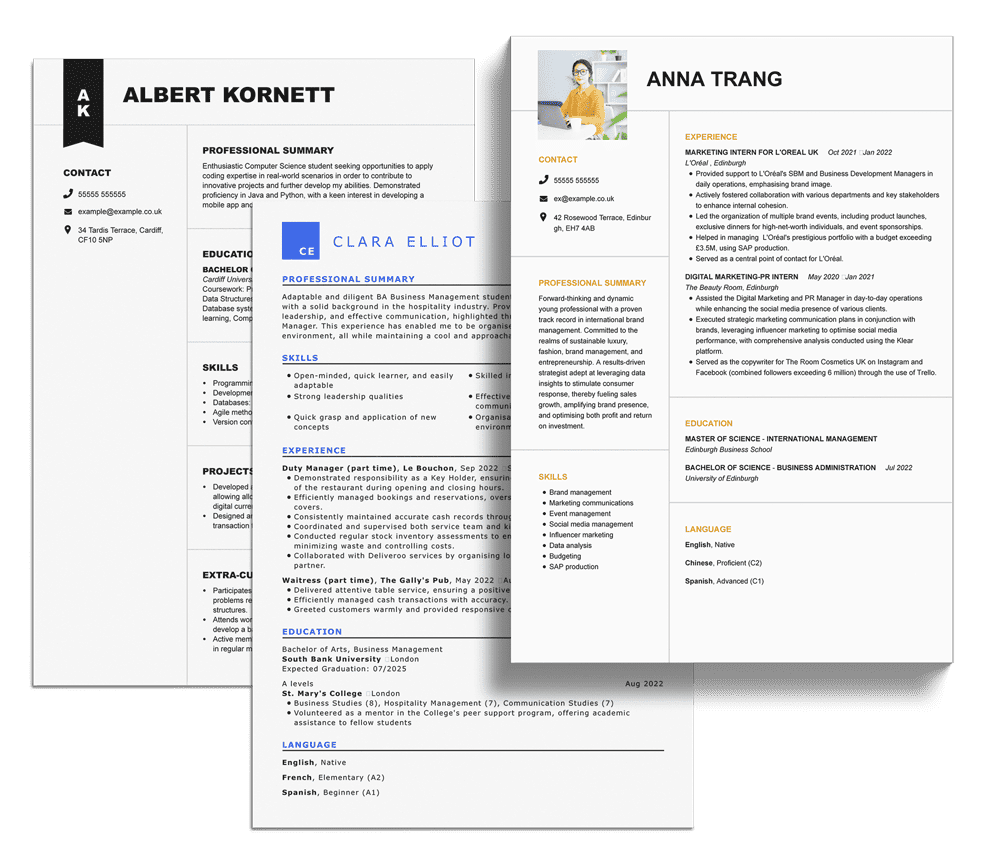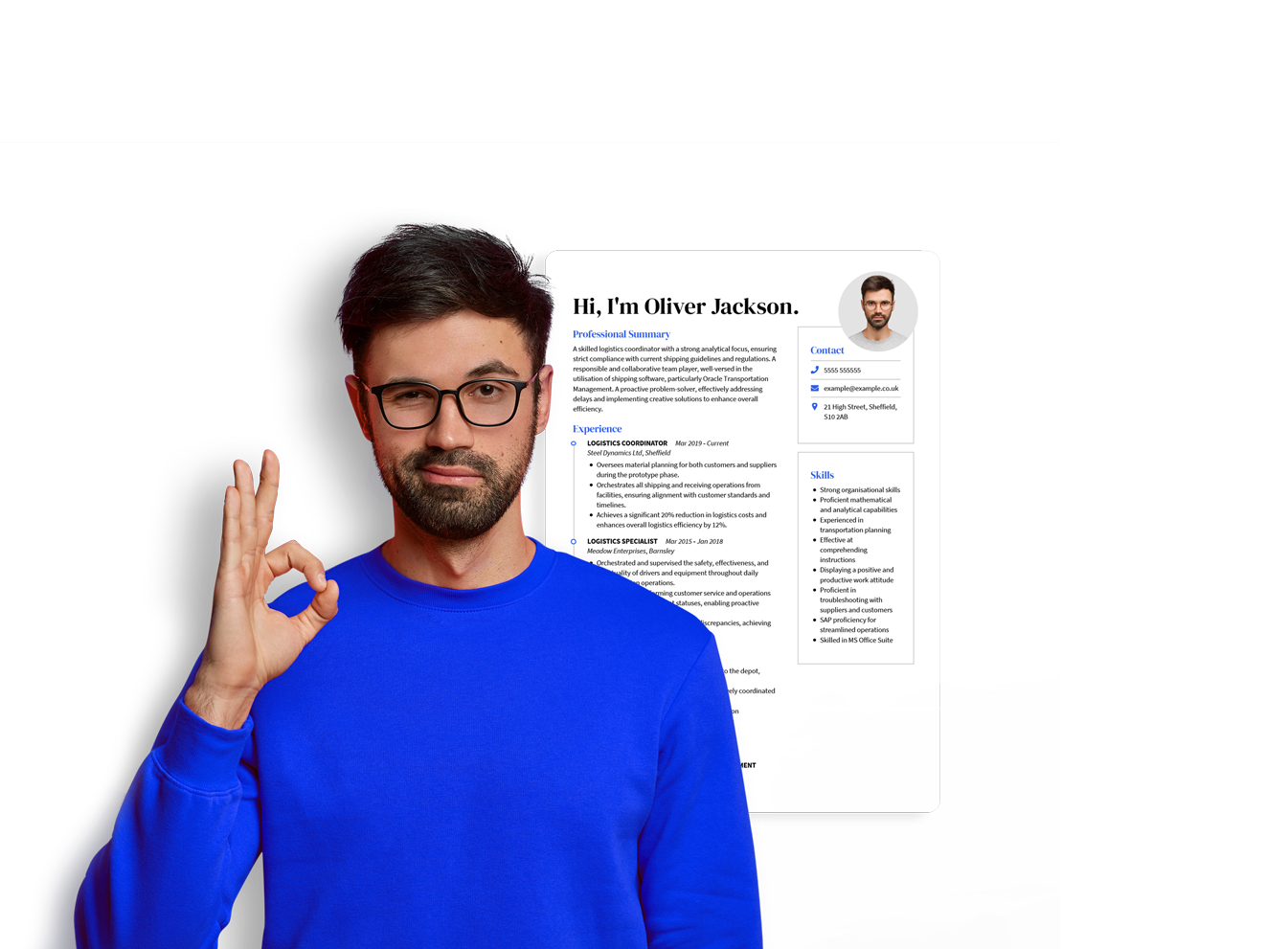How to write a student CV
Whether you are writing a graduate CV or a regular university student CV, they generally follow a structured format, ensuring that potential employers can easily identify key information. Here’s a typical CV layout:
- Header: This is the first section of your CV and it should clearly state your name, contact number, and email address. If you have a LinkedIn profile or a professional website, include these here as well. This section should be simple and straightforward, as its purpose is to allow potential employers to know who you are and how they can reach you.
- Personal statement: This section sits at the top of your CV and serves as an introduction. In the personal statement, briefly describe who you are, what you’ve achieved so far, and what you’re looking for in your next role.
- Work experience: If you’ve had any part-time jobs, internships, or volunteering roles, list them in this section. Be sure to include the role title, the company’s name, and the dates you were there. Always start with the most recent position and work backwards.
- Education: Provide details of your academic achievements, including the institutions you’ve attended, courses taken, and qualifications gained. If you’re still studying, it’s acceptable to note your expected graduation date in this section.
- Skills: Highlight any skills that are relevant to the job you’re applying to. These may include technical abilities, like proficiency with specific software, or transferable skills, such as teamwork, leadership, and problem-solving.
- Additional sections: Depending on your situation, you might also want to include sections for awards and honours, extracurricular activities, languages spoken, or any relevant certifications you hold.
Remember, the goal of a CV for students is to present a clear snapshot of your skills, experiences, and achievements, effectively showcasing why you’re the ideal candidate for the role.
Header
The header of your CV serves as your professional introduction, providing recruiters with your crucial contact details. In a UK student CV, it’s vital to keep this section concise, accurate, and professional. A correctly formatted header can set the tone for the rest of your CV, while an inaccurately formatted one can lead to missed opportunities.
Good example
James Smith
10 Downing Street, London, UK, SW1A 2AA
Phone: +44 20 1234 5678
Email: james.smith@example.com
LinkedIn: linkedin.com/in/jamessmith
This header is straightforward and professional, providing clear and precise contact information.
Bad example:
J. Smith
London
Email: rockstarjames@hotmail.com
This header is unprofessional and vague. It lacks specific contact information and uses an inappropriate email handle. Recruiters may struggle to contact you or may even disregard your CV due to its lack of professionalism.
Personal statement
The personal statement serves as a brief overview of your profile. It’s the first impression employers get about you, your professional aspirations, and what you bring to the table. It is crucial as it sets the tone for the rest of your CV. A good CV personal statement can compel a hiring manager to read further.
Good example
A highly motivated recent Business Administration graduate with a 3.9 GPA. Proven skills in project management and strong organisational abilities, seeking an entry-level position in project coordination.
Bad example:
Recent graduate looking for a job.
Instead of a personal statement, you might choose to write a CV profile or a professional summary. A CV profile highlights your professional attributes and goals, while a CV summary succinctly outlines your career history and achievements, making both options effective for capturing a recruiter’s attention.
Find below two good examples for both of these options written with the needs of university students in mind:
CV profile examples student
A diligent and dedicated History student at the University of Cambridge, with a passion for in-depth research and data analysis. Experience in conducting comprehensive historical research, presenting findings, and collaborating on team projects. Seeking an internship opportunity to further develop research and analytical skills.
A final year Engineering student at Imperial College London with a 3.7 GPA. Strong foundation in structural design, project management and innovative problem-solving. Proven ability to apply theoretical knowledge in practical contexts during a successful summer internship at XYZ Construction.
CV summary examples for students
Ambitious Economics student at the University of Manchester, with a strong academic record, including distinction in Econometrics. Completed a successful internship at a leading financial firm, demonstrating strong analytical skills and valuable industry knowledge.
Third-year Computer Science student at the University of Southampton, with a focus on software development. Developed a mobile application as part of a team project, demonstrating proficiency in Java and problem-solving abilities. Completed a software development internship at a technology start-up, gaining hands-on experience in coding, testing, and debugging.
Work Experience
The work experience section showcases your professional history and relevant experiences. It gives employers insights into your job responsibilities, achievements, work ethic and skills acquired over time. This section is essential because it shows potential employers your hands-on professional experience in the real world.
Good example
Digital Marketing Intern, XYZ Company, June 2019 – August 2020. Developed and implemented social media strategies that increased the company’s online presence by 20%.
Bad example:
Intern at XYZ Company.
Note that focusing on relevant experience, including those acquired outside of a traditional working setting, can have a significant impact on your CV. This includes experiences such as internships and volunteer work, which often provide opportunities to develop and demonstrate skills that are valuable in the job market.
For example, leading a project for a volunteer organisation may demonstrate project management and leadership skills, while an internship at a relevant company offers industry-specific knowledge and experiences. Make sure to highlight these experiences in the ‘Work Experience’ section of your CV, and articulate the specific skills and knowledge you gained from each.
Education
The education section provides a detailed account of your academic background and accomplishments. It should be formatted in reverse chronological order, with the most recent studies at the top.
It is important as it displays your educational credentials, which can be a determining factor for certain roles, especially those that require specific qualifications or areas of study.
Expanding upon the educational background section is crucial for UK students as it allows them to showcase their unique qualities and set themselves apart from other candidates. It provides an opportunity to elaborate on experiences or accomplishments that are relevant to the position but weren’t covered in depth in other parts of your student CV.
For example, a student could delve into the details of a significant project, demonstrating their problem-solving skills or ability to work in a team. This section can also be utilised to disclose any volunteer work or extracurricular activities, highlighting the candidate’s dedication, leadership, or community involvement. By providing a well-rounded view of their qualifications, students can better position themselves as a strong fit for the role.
If you’re yet to obtain your university degree, you can still list your high school education and any relevant achievements or extracurricular activities. Don’t forget to add your expected graduation date and any relevant coursework or academic awards.
Good example
Finance Student, University of London, September 2017 – June 2020.
- Graduated with a First-Class Honours degree.
- Coursework included Financial Analysis, Corporate Finance, and Financial Risk Management. Completed a dissertation on “Emerging Trends in Fintech,” demonstrating a keen interest and understanding of the subject.
- Participated as a team leader in a university project simulating a real-world business scenario, showcasing leadership and teamwork skills.
Bad example:
Studied Finance at the University of London.
The good example provides a comprehensive view of the candidate’s achievements, showcasing relevant coursework, degree classification, project experiences, and leadership skills. In contrast, the bad example is vague and doesn’t demonstrate the candidate’s full potential or the breadth of their academic experience. It falls short when it comes to presenting the candidate’s qualifications in a way that would be of interest to potential employers.
Skills
The skills section highlights your hard and soft skills that align with the job advert. It is crucial because it showcases your competence in specific areas and helps hiring managers ascertain whether your skillset matches the job requirements.
Transferable skills hold great importance in a great student CV, as they are abilities that are relevant and beneficial to a wide range of professions. These are skills you’ve gained from your life experiences, extracurricular activities, or previous part-time jobs, which are transferable and applicable to the role you’re applying for. Examples of key skills include communication, teamwork, problem-solving, leadership, time management, and adaptability.
For instance, if you’ve led a group project at university, this demonstrates your project management and interpersonal skills. If you’ve been a part of a sports team or debate club, it shows your ability to work within a team and communicate effectively.
These experiences are valuable even if they aren’t directly related to the job you’re applying for, as employers often look for well-rounded individuals who can bring diverse experiences and perspectives to their team. Moreover, as a student or recent graduate, your work experience might be limited, making transferable skills even more crucial to highlight on your CV.
Remember, when listing these employability skills on your student CV, it’s not enough to just state them – provide examples that demonstrate how you’ve used these skills in a practical setting. This evidence-backed approach will make your CV more compelling and give potential employers more confidence in your abilities.
Good example
Leadership and Time Management: Served as Student Council President, managing multiple tasks, meeting deadlines, and successfully organizing school events. This experience honed my leadership and time management skills.
Problem-solving and Teamwork: Participated in a team project for a Computer Science course, where I contributed to developing an application, solving technical issues, and coordinating with team members.
Bad example:
Was a part of the student council. Worked on a project in a team.
Additional Sections
Additional sections can include areas like honours, languages, extracurricular activities, or certifications. They provide an opportunity to showcase your diverse skillset and achievements that may not fit into other sections.
Here are some recommendations for additional sections to consider:
- Volunteer work: This section can highlight your dedication, teamwork, and leadership skills. Any voluntary experiences, whether aligned with your career goals or not, can demonstrate a proactive attitude and your willingness to take initiative.
- Awards and honours: If you’ve received any academic or non-academic awards or honours, this is the place to mention them. They provide evidence of your skills and achievements.
- Extracurricular activities: Participating in clubs, societies, sports, or other activities can showcase a range of transferable skills such as teamwork, leadership, and time management. It also indicates you’re a well-rounded individual.
- Languages: If you speak any languages other than English, listing them can be an asset, particularly for roles that involve communication or are in multinational companies.
- Certifications: Any relevant certifications, such as IT or first-aid training, can be included here. These can be especially helpful in certain sectors or roles.
Remember, these sections should add value to your CV and support the overall narrative of who you are as a candidate. Keep them concise, relevant, and tailored to the specific role or industry you’re targeting.
Good example
Languages:
Bad example:
Languages: Speak some Spanish and French.


